Day 6--May 18--Wednesday: Lunch for two, Lilacs by the thousands, Off on a train ride
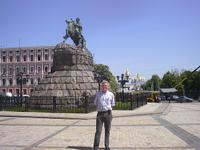 Monument to Hetman Khmelnytsky, 17th century Ukrainian hero
Monument to Hetman Khmelnytsky, 17th century Ukrainian heroOn this, our last day in Kyiv, we were able to get off to town on our own. This was facilitated by the fact that we had made a tentative appointment to have coffee with the Commercial Attaché from the American Embassy. We had met him during his previous posting at Lisbon, and we had spoken with him by phone to see if we could work it out and get together over coffee to exchange impressions of Ukraine. We took the bus to the area where he works and called him to see if he was free. As it turned out, he wouldn’t be free until the afternoon, and by then, we had other engagements. The meeting didn’t happen, but we made the most of our day on the town.


 We went into one of the big market areas, a sort of open-air bazaar. You can buy anything from toiletries to toilet fixtures in the small stalls that form a labyrinth of narrow passageways. We were looking for only two things: a certain type of hairbrush to replace the one Abbie had left in Madeira, and some shoe polish. We were successful on both counts, and it cost us almost nothing. Some things are really cheap here. (Upper left) Old woman tries to sell her onions beside a booth with housewares. (Upper right) Electrical supplies and small appliances. (Lower right) Rows upon rows, literally, of eggs. Guess what we were served a lot of!
We went into one of the big market areas, a sort of open-air bazaar. You can buy anything from toiletries to toilet fixtures in the small stalls that form a labyrinth of narrow passageways. We were looking for only two things: a certain type of hairbrush to replace the one Abbie had left in Madeira, and some shoe polish. We were successful on both counts, and it cost us almost nothing. Some things are really cheap here. (Upper left) Old woman tries to sell her onions beside a booth with housewares. (Upper right) Electrical supplies and small appliances. (Lower right) Rows upon rows, literally, of eggs. Guess what we were served a lot of!Some things are not cheap, though. We decided to go back to the Da Vinci Fish Club, since we had the discount card. The décor is as nice as any restaurant here in Madeira, and the prices are not far behind the expensive restaurants here. On the Ukrainian wage scale, it was exorbitant. The cost for two persons would be more than an average person’s weekly salary. We really enjoyed the grilled vegetables, as we found that there was not a lot of variety of vegetables in the market: radishes, cucumbers, tomatoes, green onions, and little else.
The plan was for us to go to the Botanical Garden in the afternoon to see the lilacs in bloom. We were to call Petro to arrange a meeting, so he could go with us. The bus line from his house ends at the main square of Kyiv, where the Eurovision Song Contest was to start that same evening and last for two or three days, so we waited there for him. In the end, it was Lidiya who showed up. (Left, below) Something had come up and Petro could not come.


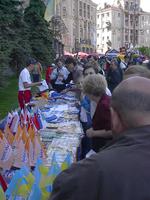 The Maidan Square was already filling up with people for the Eurovision Song Contest as we walked through the center of the city to catch a bus to the gardens. The center of town was all closed to traffic, again. I always think of this avenue as being closed to traffic. It was closed two years ago for the VE Day parade; it was closed a few days ago for the European Day; now it was closed for the Song Contest. I think it may be closed to traffic on weekends anyway. I know some of the other streets of downtown Kyiv are closed to vehicles every weekend, so people can just get out and stroll through town. (Upper right) The blue shirt identifies a member of the Hospitality Program for the Eurovision Song Contest. (Left) Souvenirs, anyone?
The Maidan Square was already filling up with people for the Eurovision Song Contest as we walked through the center of the city to catch a bus to the gardens. The center of town was all closed to traffic, again. I always think of this avenue as being closed to traffic. It was closed two years ago for the VE Day parade; it was closed a few days ago for the European Day; now it was closed for the Song Contest. I think it may be closed to traffic on weekends anyway. I know some of the other streets of downtown Kyiv are closed to vehicles every weekend, so people can just get out and stroll through town. (Upper right) The blue shirt identifies a member of the Hospitality Program for the Eurovision Song Contest. (Left) Souvenirs, anyone?It was a long way to the bus stop, and the weather was hot, too hot for the coats we were carrying. When we got to the Botanical Gardens, we discovered that a lot of other people had come to see the lilacs, too.


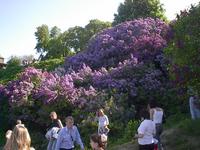
Kids played in the water around the fountain at the entrance (left), although the water didn’t look too clean. The horse chestnut is the symbol of Kiev, and the streets of the city are lined with them. They, too, are in full bloom at this time of year, but the lilac could just as well have been chosen as the symbol of the city, judging by the abundance of lilacs.
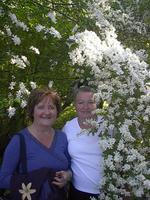
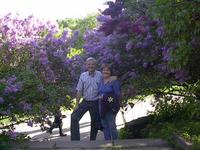
They bloom in all shades ranging from white to deep purple.(Above) What we find strange is that Madeira, known for its many varieties of flowers, both native and introduced from abroad, has no lilacs. (Left) Abbie and Lidiya stand in the shade of another flowering bush, which we couldn't identify.
To get back to the house, we were able to catch a bus that would allow us to make connections without having to walk. In the confusion of collecting for the tickets, the lady conductor gave my change to someone else. I gave her 5-UAH bill and should have gotten back 4. Instead I got 1 UAH, that is, change for a 2-UAH bill. I mentioned to her that I had given her 5, and looked at a young couple she had just given 4 UAH in change to. I told her to not worry about it, but I was sure I had given her 5. She went on to the back of the bus to collect, and a lady seated near where I was standing asked me if I had given 5 UAH. When the conductor came back to the front of the bus, the passenger made a point of bringing up the matter to the conductor. At this, the conductor turned to the young couple and demanded in a loud voice that they return the 4 UAH change and wouldn't stop until they did. I gave her back the 1 UAH I had gotten, and she gave each of us our rightful change. She not only apologized to me then, but later on she came back by and apologized again. I was willing to let it go; the 3 UAH at stake were insignificant in financial terms (1 UAH = $0.20), but it was a matter of professional pride and justice that caused her to go to such lengths.
We found the people were friendly and open to foreigners, although English-speakers are not very common. In the coffee-shops and restaurants, the attendants were young people and spoke sufficient English. The infrastructures still are lacking for non-speakers of Russian or Ukrainian, however. There is an almost total absence of notices and sign posts in English. On the highway, the names of towns are typically spelled in Western characters, but that’s about it.
We had time to get a bath and eat a bite before Petro took us to the train station. It was 10:20 p.m. when the train pulled out. Arrival time in L’viv: 6:50 a.m.
We had bought tickets for a sleeper car, which cost about $10 each for the one-way fare. On the train we had to pay an extra $1.40 each for the use of sheets, blankets and pillow cases. We shared our compartment with two men from L’viv who, fortunately, had only a shot or two of vodka left in the bottle they brought on board with them. They weren't drunk and there wasn't enough liquor in the bottle to get them that way. The lights were out and we were all trying to sleep by shortly after 11:00. But the air conditioner wasn’t working, and in that small compartment, with the door closed and no open window, it was too hot and stuffy for comfort.



0 Comments:
Post a Comment
<< Home